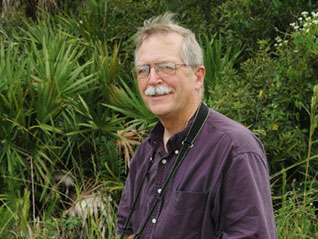
Photographed by Bette Jackson
If you are have difficulty playing the audio click here
Length of Segment: 00:01:16
Hi, I'm Dr. Jerry Jackson, out with the wild things. Oleander, a common landscape plant in South Florida, is a native of the Middle East, but can now be found in warmer climates around the world. Oleander can grow to twenty feet tall, but typically is much smaller. In summer, it's known for its long-lasting profusion of flowers. And cultivars include plants with white and various shades of pink to red and even salmon-colored blossoms. Oleander produces an abundance of erect stems that rarely branch. As a result of this lack of branching, birds rarely use oleander for nesting; there is little support for nests. The name 'oleander' seems to come from two Latin roots: Olea, which refers to the olive tree of the Middle East, and lorandrum, referring to other plants such as the rhododendrons, and laurels. The Latin word oleo, meaning fragrant, applies both to the blossoms of the olive tree and oleander. The leaves of oleander are evergreen, leathery, shaped like a slender knife blade, and up to six inches long, similar to those of laurels.
'With the Wild Things' is produced at the Whitaker Center in the College of Arts and Sciences at Florida Gulf Coast University. For 'The Wild Things', I'm Dr. Jerry Jackson.
< Back to Oleander
For permissions please contact the owning institution. WGCU Public Media, 10501 FGCU Blvd. S., Fort Myers, FL 33965




